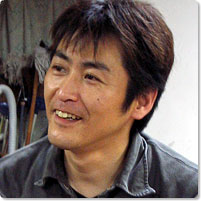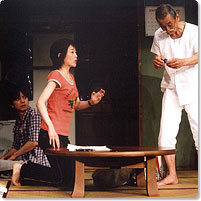Bungaku-za Atelier no Kai
Nukegara
(at Bungaku-za Atelier, 2005) Photo: Kenki Iida
Data
:
First Performance: 2005
Performance time: 2h 10min
Acts / Scenes: 1 act, 7 scenes
Cast: 11 (7 men, 4 women)
Norihiko Tsukuda
Nukegara

Norihiko Tsukuda
Norihiko Tsukuda was born in Nagoya in 1964. He is a playwright, director and actor who graduated from Meijo University. He is leader of the theater group B-kyu Yugekitai. Using outlandish situations, he creates a theater world that unfolds in a straight and rhythmical way peppered with comedy. He has won many prestigious awards, including the 3rd Nagoya City Culture Promotion Award for his play Shimpan–Horonigaki ha Caramel no Aji , the Playwright Association Outstanding New Playwright Award and the Yomiuri Theater Grand Prix Outstanding Play Award. The play Nukegara for which he won the 50th Kishida Drama Award was written for an Atelier performance at the Bungaku-za theater.

It is midsummer and the scene is a 2-room apartment in a prefecture-run housing project. Outside the sound of the cicadas is intense. The man’s name is Takuya Suzuki. The day before was the funeral of his mother, and he has just recently been fired from his job at the post office. His wife Mitsuko has just brought divorce papers that she wants him to sign, and as he tears them up in front of her, she rants on about his noncommittal lifestyle and his belief that everything will eventually get better if you just roll with the punches. On this scene enters Takuya’s father, who seems a bit senile and not really aware that his wife has just died. After Mitsuko leaves, having handed Takuya a spare set of divorce papers and told him to sign them, he sits down and starts to fold them into paper airplanes. Seeing that, his father, who is drinking, launches into a story about the time make a single-landing-gear landing when he was a pilot during the war. That night, a sleepy-eyed Takuya finds a “shed skin” (
nukegara
) of his father’s lying against the toilet. Having shed his skin and suddenly grown 20 years younger, his naked father gets up out of bed.
After that, the father proceeds to shed his skin five more times in different places, leaving one shed skin after another and growing about ten years younger with each shedding. At the same time, the father’s memory goes back to the age of his rejuvenated body at each shedding.
From the 60-something father who woke up and went for a walk every morning at 6:00 a.m., he goes back to the time in his 50s when he had an ulcer. Then he becomes the happy-go-lucky father in his 40s playing in a Hawaiian band at a bar that caters to the U.S. occupation force soldiers. Next he is the carefree, unfaithful father in his 30s who makes a pass at any girl in sight. Then he is the young soldier in his 20s at the time he first met Takuya’s mother and is waiting to be sent off to the front. Talking to these different rejuvenations of his father, Takuya has opportunity to reflect on how he has related to his father up until now and also discovers sides of father before he was born that he had never known about before.
Next, the spirit of his mother in her younger days appears out of the refrigerator and begins to prepare dinner. When she sets a big meal of chilled barley noodles on the table, the “shed skins” of the father at his different ages all rise and come to the table for a noisy meal of eight hungry people. When Takuya asks his mother how she managed to tolerate living with all these fathers, she replies that all in all she actually enjoyed it.
In the last scene, the shed skins are once again lying around the room. It is 49th day after the death of the father, who passed away soon after the first scenes. The shed skins stand up one after another and Takuya sees them off with the movie camera he used in his college days when he was a member of the film club. That is his farewell and his blessings to his father. Alone now, Takuya gazes at the red sky of evening, saying, “Things are going to get better now that summer is over.”
Related Tags

